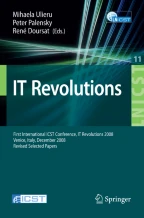Abstract
The vast amount of data being generated by large scale omics projects and the computational approaches developed to deal with this data have the potential to accelerate the advancement of our understanding of the molecular basis of genetic diseases. This better understanding may have profound clinical implications and transform the medical practice; for instance, therapeutic management could be prescribed based on the patient’s genetic profile instead of being based on aggregate data. Current efforts have established the feasibility and utility of integrating and analysing heterogeneous genomic data to identify molecular associations to pathogenesis. However, since these initiatives are data-centric, they either restrict the research community to specific data sets or to a certain application domain, or force researchers to develop their own analysis tools. To fully exploit the potential of omics technologies, robust computational approaches need to be developed and made available to the community. This research addresses such challenge and proposes an integrative approach to facilitate knowledge discovery from diverse datasets and contribute to the advancement of genomic medicine.
Access this chapter
Tax calculation will be finalised at checkout
Purchases are for personal use only
Preview
Unable to display preview. Download preview PDF.
Similar content being viewed by others
References
Rhodes, D., Kalyana-Sundaram, S., Mahavisno, V., Varambally, R., Yu, J., Briggs, B., Barrette, T., Anstet, M., Kincead-Beal, C., Kulkarni, P., et al.: Oncomine 3.0: Genes, Pathways, and Networks in a Collection of 18,000 Cancer Gene Expression Profiles. Neoplasia 9(2), 166 (2007)
The Cancer Genome Atlas Research Network: Comprehensive genomic characterization defines human glioblastoma genes and core pathways. Nature 455(7216), 1061–1068 (2008)
Peña-Castillo, L., Tasan, M., Myers, C., Lee, H., Joshi, T., Zhang, C., Guan, Y., Leone, M., Pagnani, A., Kim, W., et al.: A critical assessment of Mus musculus gene function prediction using integrated genomic evidence. Genome Biology 9(suppl. 1:S2) (2008)
Wolfson, W.: caBIG: Seeking Cancer Cures by Bits and Bytes. Chemistry & Biology 15(6), 521–522 (2008)
Author information
Authors and Affiliations
Editor information
Editors and Affiliations
Rights and permissions
Copyright information
© 2009 ICST Institute for Computer Science, Social Informatics and Telecommunications Engineering
About this paper
Cite this paper
Peña-Castillo, L., Phan, S., Famili, F. (2009). An Integrative Bioinformatics Approach for Knowledge Discovery. In: Ulieru, M., Palensky, P., Doursat, R. (eds) IT Revolutions. IT Revolutions 2008. Lecture Notes of the Institute for Computer Sciences, Social Informatics and Telecommunications Engineering, vol 11. Springer, Berlin, Heidelberg. https://doi.org/10.1007/978-3-642-03978-2_24
Download citation
DOI: https://doi.org/10.1007/978-3-642-03978-2_24
Publisher Name: Springer, Berlin, Heidelberg
Print ISBN: 978-3-642-03977-5
Online ISBN: 978-3-642-03978-2
eBook Packages: Computer ScienceComputer Science (R0)
